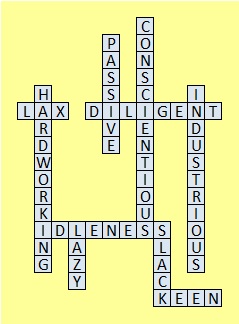 It can be really frustrating when you’re trying to run a youth work program and you can’t seem to get anything done. Especially when it feels like (or actually is) because others around you aren’t doing their share.
It can be really frustrating when you’re trying to run a youth work program and you can’t seem to get anything done. Especially when it feels like (or actually is) because others around you aren’t doing their share.
And I know that not everyone thinks the same way, works the same way or manages their time in the same way. Not everyone loves spreadsheets or gets a particular sense of excitement and satisfaction from creating a clear and useful youth behavior policy. That doesn’t make it any less frustrating when I’ve done my part, turned up on time and sometimes put literal blood, sweat and tears into a youth work project.
It’s easy to be tempted to slack off. To hang around longer chatting to co-workers, to sneak onto Facebook to turn up five minutes late and leave five minutes early each day. Everyone else seems to and no one seems to care or notice… so “when in Rome”, right?
Wrong.
Besides the fact that people are watching – trust me, someone, somewhere, sometime is watching – working, or not working, reflects on you and your integrity. What do you do when you think no one is watching? Working with integrity can be frustrating and some days downright depressing, especially when it feels like no one is seeing the good work you’re doing.
However, there are three reasons to work hard, even when no one is looking:
- You get a great reputation. By working hard and staying busy (and not just looking like you’re busy), you’ll cultivate a reputation as someone others can turn to to get a job done. When everyone else seems unable to move a youth work program forward, you become the person that can make it happen.
- You get a great program. Your program will run more smoothly since you take the time to plan, create excellent material for delivery and monitor and evaluate your practice and program. This makes you a better worker and makes your program shine compared to others who deliver the bare minimum, in the shortest amount of time with the least amount of thought and effort possible.
- You get freedom. This may not be the case 100% of the time, but more often than not supervisors and managers are more willing to give you more freedom in your work, time off when you ask and more responsibility and ownership over your program. When your manager sees that you can be trusted when you’re only working for ‘yourself’, they’re more likely to trust you when you’re working ‘for them’.
Warning: You will most likely end up with haters. People who want to highlight mistakes you do or make you feel bad for working hard. For being a ‘goody-goody’ or ‘suck-up’. Yes, even adults seem to have these feelings.
The best advice for that is ‘haters gonna hate’ so just keep going. Do your thing and do it well. It will be worth the effort in the end.
Question: Have you ever felt like you’re working hard while everyone else isn’t? What did you do? What advice do you have for other youth workers in that position? Share your thoughts in the comments below.
You can also connect with us by:
- Signing up to receive our posts via email
- Following us on Twitter
- Liking us on Facebook
- Signing up to our RSS feed